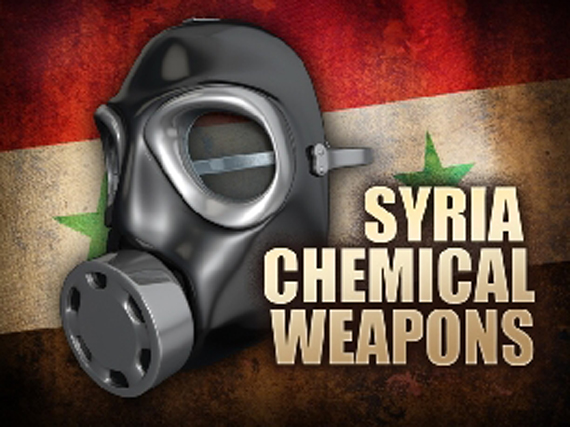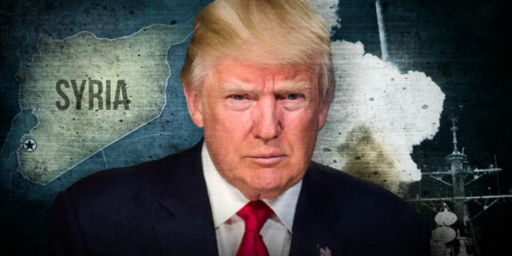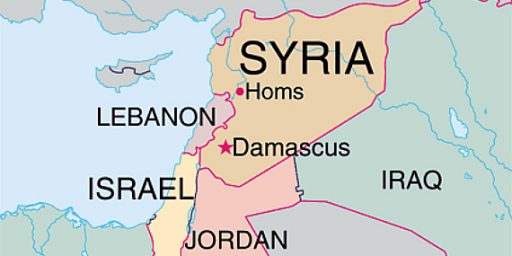Almost All Of Syria’s Chemical Weapons Have Been Removed, Should Obama Get The Credit?
The removal of chemical weapons from Syria is nearly complete. Does Obama deserve credit for that?
The New York Times reports on the progress of the joint U.S-Russian program to remove Syria’s chemical weapons from the country, and it’s hard to characterize the program as anything other than an unqualified success:
Nearly 90 percent of the chemicals in Syria’s weapons arsenal have now been removed from the war-torn country, with only two or three shipments left for export, the group responsible for policing the global treaty that bans chemical munitions reported on Tuesday.
The declaration by the group, the Organization for the Prohibition of Chemical Weapons, came as new allegations have emerged about the Syrian military’s possible use of bombs containing chlorine, a commonly used industrial chemical that was not on the list of toxic compounds declared by Syria when it agreed to renounce the use of chemical weapons last year.
Both the United States and France have said they take seriously the still-unconfirmed reports that earlier this month Syrian forces used chlorine in an attack on a village occupied by insurgents in the three-year-old civil war. Jen Psaki, a spokeswoman for the State Department, told reporters in response to questions about the reports on Monday: “Obviously, there needs to be an investigation of what’s happened here. We’re working with our partners to determine what the facts are on the ground.”
“This latest consignment is encouraging,” the director of the Hague-based organization, Ahmet Uzumcu, said in the statement. “We hope that the remaining two or three consignments are delivered quickly to permit destruction operations to get underway in time to meet the midyear deadline for destroying Syria’s chemical weapons.”
Regardless of how one feels about President Obama’s threats of military force against Syria in July, and his efforts in August to get a very reluctant Congress to authorize the use of force in response to Syria’s use of chemical weapons against civilians during the country’s still ongoing civil war, the removal of chemical weapons from Syria would seem to be a positive development. First of all, of course, there is the fact that this class of weapons has been banned by international treaties stretching back to the end of World War One in response to the horrific effects they had in the trenches of Europe. For that reason alone, the fewer chemical weapons in the world, the better. Second, even before the civil war started the Assad government, both under Bashar Assad and his father before him, was a pariah regime that could never be trusted with weapons capable of causing such horrific death and injury. The fact that the Syrians finally used these weapons is a surprise not because it seemed so out of character for them, but because it seemed as though the fear of international retribution was the one thing preventing them from doing so. Finally, the fact that Syria remains in the middle of a civil war in which many of the rebels fighting against the government are sympathetic to terrorist organizations made the risk of those weapons falling into the hands of people even less reputable than the Assad regime quite high. Indeed, if there was one thing that might have led to Western intervention in Syria’s civil war, it it was the possibility that the sudden collapse of the regime in Damascus would have put the command and control of chemical weapons in uncertain hands. With those weapons gone, or at least nearly so, this is something we no longer need to fear.
The question, of course, is whether President Obama deserves credit for all of this.
His more ardent supporters, no doubt, will make the claim that it was the President’s threats of military action, and the possibility that he would act without getting permission from Congress despite having taken the step of asking for it, that brought the Syrians and, more importantly, the Russians, to the table and led to the agreement between Secretary of State Kerry, Russian Foreign Minister Sergey Lavrov that is now being implemented. The President’s critics will argue that, in the end, the President bungled his way into the agreement that was reached with the Russians and the Syrians, and that his policy actually failed to the extent that it was meant to influence the outcome of the Syrian civil war. Indeed, since the agreement was reached the war has essentially disappeared from news coverage in the United States and the Assad Government has continued killing rebels and civilians by conventional means. Personally, I tend to fall in with the second group, since it always seemed apparent to me that the threats of military action against Syria were about more than just chemical weapons. The Obama Administration was looking for a way to put its thumb on the scale in favor of the rebels and the use of chemical weapons seemingly gave them an excuse to do that. By agreeing to get rid of the weapons, the Russians and Syrians called the President’s bluff.
However the political argument ends up, though, we should all be happy that the removal of chemical weapons from Syria appears to be a resounding success. At least that’s one less problem we have to worry about.






Let’s see… It was his policy, which he promoted against opposition. He got it implemented, and it worked.
I suppose if you tried hard enough you could find a pretense for not giving him credit for that, but it would probably entail never giving any sitting President credit for anything, ever again. Is that the goal here?
The President’s critics will also argue that he’s a Muslim and wasn’t born in the US. Your point?
Besides, you didn’t ask whether he should get credit for ending the Syrian civil war. You asked whether he should get credit for the elimination of the Syrian chemical weapon stockpile. The correct answer is “Yes”, or possibly “Duh.”
Then there are those afflicted with ODS, Doug.
No, no, Obama has a “manhood” problem, thats’ the talk track – did you not get the memo?
@anjin-san:
damn…you beat me to it…
Let’s try the contra view, Doug – if not Obama, then who _should_ get credit?
Assad? Hell no.
Putin? Not bloody likely.
The Syrian rebels themselves? Uh-uh.
Any Republican at all? What did any of them do except criticize Obama for not doing a different thing every day?
About the only person left who had anything to do with it would be Kerry, and hell – that’s just like giving Obama credit!
Seriously – that sentence is pure gibberish.
Obviously he deserves credit. Who else deserves the credit, Sarah Palin? Jesus? The Avengers?
Not the most brilliant post ever.
Republicans will insist that their man in Moscow (and in the Crimea) Valdimir Putin, should get the credit.
Reasonably effective bungling, I’d say. And I mean that sincerely: I think there was indeed bungling going on. Now it’s very possible that it wasn’t really bungling but sabre-rattling I considered dangerous, which worked. Or worked somewhat (after all, the sabre-rattling was undercut when Parliament and then Congress started to balk).
Either way, it worked out reasonably well. Seriously, what plausible real-world result is better than this, from a US perspective? We didn’t put anyone in harms way, we didn’t blow anything up (for once), and we reduced a stockpile of chemical weapons in a country torn by civil war. Given the situation, what more was possible?
I was VERY skeptical of the administration’s approach re: Syria. I was downright pissed off, and worried. But I’m really pleased to see things work out the way they have.
As for credit, well color me shocked you don’t want to give the Obama Administration any.
@al-Ameda:
Zing!
@ al-Ameda
Dude have you seen Putin’s guns? Of course he deserves the credit. Now if only we could get more photos of him with his shirt off…
If it was a coordinated gamble jointly hatched by Putin and Obama, it’s obvious that Assad could not allow himself to be perceived as “knuckling under” to the US. Therefore, for the near future, Putin gets all the credit. He was the “adult in the room” on this one, regardless of whether the solution was stumbled into or planned.
The results of foreign policy decisions, for good or ill, reflect on the Executive Branch.
Sure, you got the outcome you sought, but you bungled it! Because….umm, Rand Paul and Lindsay Graham agree that we should stay out of it/invade and occupy.
I guess with all the favorable news about Obamacare, which Doug must studiously ignore, he just has to invent a “bungled” story, so he tries to turn success into failure.
Obama is very pragmatic, perhaps to a fault. And pragmatism is something that very few people, and apparently no conservatives, understand. The correct way to view it is that Obama, our inexperienced, fumbling, leader from behind “bungled” into the result he wanted, again.
I simultaneously think Obama’s Syria policy has been bungled, that he stumbled into this arrangement via the Russians seizing the initiative on a flippant remark by John Kerry, and that Obama deserves credit for this outcome. Was this the plan all along? Hell no. But it wouldn’t have happened without him.
@James Joyner:
Without him?
Yes – fixed!
@James Joyner:
An astonishing amount of what gets accomplished in this world comes as a result of grabbing unplanned-for opportunities. I think there’s a strong prejudice in favor of the carefully-planned move. People don’t really like opportunism. It seems more random and Americans hate randomness.
Me, I’ll take a wily opportunist any day of the week. Plans never outlive contact with the enemy, but opportunism is forever.
Of course I have my own ax to grind on that since my entire life, and my work, is all opportunism.
@michael reynolds: Certainly true. WRT Syria, I mostly wish Obama and company had just shut the hell up, rather than posturing about eventualities they–rightly–had no intention of backing up. It’s a heartbreaking situation but not one we can fix.
But, yeah, stumbling into ridding a heinous regime of most of its chemical weapons is an outcome we can all laud.
@michael reynolds:
I give Scarlett Johansson credit for everything.
@James Joyner:
Why “hell no”? Think it impossible they had their best people stewing over this, sorting out plans A thru whatever, for months?
@James Joyner:
I mostly wish Obama and company had just shut the hell up, rather than posturing about eventualities they–rightly–had no intention of backing up.
Why? If a threat you don’t intend on delivering on still achieves the right outcome, isn’t that a good thing? I don’t see the problem with it. Why do you, foreign policy expert that you are, not see the value that posturing can have sometimes? Posturing can save lives, and in this case surely has.
If Reagan can get credit for winning the Cold War, Obama can get credit for this.
@Stonetools:
Not yet. Assad would be humiliated by US triumphalism.
IMO, the rebels have lost and the best thing that can happen is they realize they must make their peace with Assad as soon as possible. It would be more difficult to do so with “Obama’s chump Assad”.
Alternative reality scenario: GW Bush repeatedly rattles the saber at Saddam Hussein over claimed WMDs and makes motions of possibly going to war. At the last minute, Saddam relents and allows weapons inspectors into Iraq (and lets also say an intermediary helps this come about). Bush, who never meant to go to war, withdraws the threat and inspections proceed.
In this scenario, not knowing how Iraq really turned out, how would Doug and James respond? Would they complain that Bush weakened the US because he made a threat he didn’t intend to follow through on? Would they say he bungled it? I thought this alternative reality was a real possibility at the time, and I would’ve called it a master stroke, but what do I know.
I also think I recall Doug saying at some point during this Syria thing, probably around the time of the “red line” remark, that Obama would be foolish to align with the Syrian rebels. Am I remembering correctly?
@Steve V:
In this scenario, not knowing how Iraq really turned out, how would Doug and James respond? Would they complain that Bush weakened the US because he made a threat he didn’t intend to follow through on? Would they say he bungled it?
Only if he became a Democrat first.
@dazedandconfused: Did they have their best people on this? Sure. Did they threaten war for using chemical weapons, allow it to happen once for free, ramp or for war and ask Congress permission to go after a second use, and then back out over a pledge to destroy stockpiles? That seems too clever by half.
@mantis: @Steve V: The problem with delivering threats and drawing red lines while having no intention of actually delivering is that it puts you in a position to either have to follow through when one’s bluff is called or back out and look weak. The second is generally preferable but it makes future threats less credible. The ideal threat is one that achieves one’s policy goal while also averting a war one would have fought if said goal were not achieved.
In the case of the both Iraq and Syria, chemical weapons was one issue among many but not the primary policy objective. The Obama administration’s goal, which I share, is ending the civil war. They wisely decided not to intervene but nonetheless kept up rhetoric demanding regime change. I’d have preferred condemnation without empty threats.
James,
No more clever than it had to be. “Our” best people on it, not “theirs”. DIA, CIA, all the kings eggheads and all the kings geeks. Also, experienced professionals, many of them well practiced from hunting the likes of Zarqawi, such as Flynn, are still around. They would have been tasked to stew over the “what if’s” of this for several months.
I don’t understand “allow it to happen once for free”. There were several small uses of this and that, some obvious false flag (a silly pool chlorine IED was one) and some harder to suss out. The administration acted very quickly when the biggie happened, like they had a plan.
I suspect he only asked Congress after being notified by Putin he had a deal, only way that makes sense. If he wanted to bomb the place he would have used the “element of surprise” stuff every other President has, even himself in Libya.
If the goal is to get rid of the stockpiles getting rid of them ends the need for attack, right? I’m at a loss on that.
@dazedandconfused: The stockpile was never the main issue; regime violence was. The drawing of the “red line” was presumably aimed at preventing the escalation of the conflict but, yet, Assad was able to get away with crossing said line. That he’s now giving up his stockpiles is great, but it doesn’t change the previous use, much less the mass slaughter.
@James Joyner:
OK, we have a fundamentally different view, so I’ll back off.
I’m working with the assumption the CW was the issue. Scared everybody, even Iran, so it was plausible everybody could work together on that narrow issue IF it started to get out of control. I would be in complete agreement that if ending the Syrian conflict was the goal this administration has acted in an incredibly inept way.
@James Joyner:
Assuming that the end goal was ending the conflict assumes that we had a likely winner we liked. We didn’t and we still don’t. Therefor I think that the red line was, as it was stated, about the chemical weapons. If the end goal was about chemical weapons then this is an unequivocal win for the Obama administration.
@James Joyner:
The stockpile was never the main issue
Chemical weapons most certainly were the main issue. Here’s the “red line” quote:
“We have been very clear to the Assad regime, but also to other players on the ground, that a red line for us is we start seeing a whole bunch of chemical weapons moving around or being utilized. That would change my calculus. That would change my equation.”
Not if Assad kills a lot more Syrians. Not if he sends death squads after women and children. Not if he drives all the rebels into the sea. The red line was the use of chemical weapons. It was all about chemical weapons. Here’s the question he was responding to, from Chuck Todd:
Mr. President, could you update us on your latest thinking of where you think things are in Syria, and in particular, whether you envision using U.S. military, if simply for nothing else, the safe keeping of the chemical weapons, and if you’re confident that the chemical weapons are safe?
Again, all about chemical weapons. You and the other GOP detractors have been rewriting history on this to dishonestly attack the president, and you are still doing so despite the positive outcome.
I’d have preferred condemnation without empty threats.
I prefer getting rid of Syria’s chemical weapons over your proposal to do jack shit and blame the president when nothing comes of it.